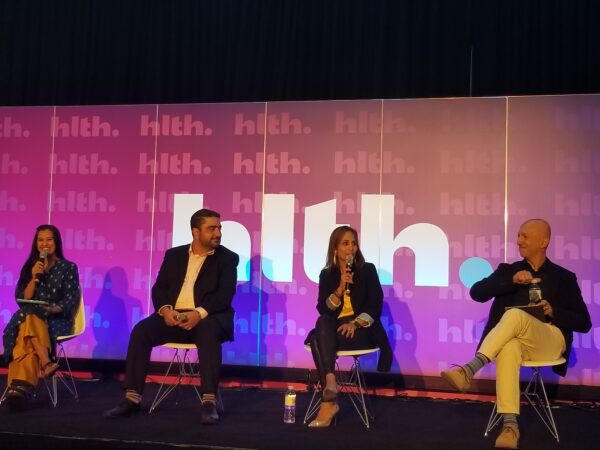
Panel discussion on Harnessing AI and Analytics as a Force for Good at Payer Insights Program. From left: Arundhati Parmar of MedCity News (moderator); Amir Azarbad, of 10Pearls; Dr. Ainsley MacLean of Kaiser Permanente; Eugene Sayan of Softheon
Health insurers, self-insured employers, and government plans wield significant power in the U.S. healthcare landscape. Their decisions on reimbursement, technology adoption choices, and how they communicate with members reverberate across the healthcare ecosystem. In order to gain more members and simply maintain their business, they will need to take on more risk and make themselves more accessible to members. Their future depends on validating digital health tech, such as machine learning, as a means of reducing friction in healthcare, simplifying revenue cycle management, improving health equity, and improving healthcare navigation for consumers.
The Payer Insights Program at HLTH 2023 offered a series of panel discussions on topics connected to health insurers. Health tech companies, payers, and at least one “payvider” discussed health equity, AI, and healthcare innovation. Here are some of the highlights of these conversations.
AI could make the user interface on health insurer websites easier for members and consumers looking for a new plan to navigate.
Eugene Sayan, Softheon Founder and CEO, discussed how the company is working with payers to make the insurance navigation and decision-making process for consumers more intuitive and less complicated.
“[Deciding on] the correct health plan is probably one of the most complex and most troubling experiences for any consumer,” Sayan acknowledged. Shopping for health insurance is consistently rated among the lowest by retail experience. Sayan explained that’s why he is currently focused on the consumer side.
“This is an area where we believe that AI will have tremendous impact. But it is a big responsibility,” Sayan said.
How healthcare companies and employers talk about AI can be as important as the use cases they plan to implement.
AI offers a great deal of potential for healthcare but there are currently more challenges to figure out than not. Amir Azerbad is managing director of healthcare with consulting business 10Pearls. He advises clients to focus on the most relevant use cases for automation to drive meaningful change within businesses. But he emphasized the need to communicate this to employees in such a way so they understand the goal is a strategic deployment, rather than replacing jobs on a massive scale. Azerbad acknowledged that these can be difficult but important conversations.
Dr. Ainsley MacLean, Chief Medical Information Officer with Kaiser Permanente, said she recommends that doctors get certified through the American Board of Artificial Intelligence and Medicine. MacLean noted that nearly 50 physicians across Kaiser Permanente have received certification.
“It helps them to sit around the table with data science and with our engineers, and come up with a thoughtful approach,” MacLean said.
Reliable data is crucial for building the trust of healthcare stakeholders.
It may sound obvious, but this is a consistent message in almost all health tech conversations and the discussion at the Payer Insights Program was no exception. If data is outdated, inconsistent, or unreliable, it undermines confidence in applications.
Kaiser Permanente is developing several types of AI applications aimed at clinical use.
MacLean highlighted a few areas of interest:
- Ambient listening/recording of physician-patient interactions will enable physicians to focus even more.
- Enlisting AI within the patient portal to support remote patient monitoring
- The third is within the electronic medical record itself to streamline physicians’ work
- Cybersecurity to protect patient data
- Anything related to medical images, including radiology, cardiology, gastroenterology, and enterprise technology
A tech-driven approach to health equity falls short of what’s needed
People who don’t know where their next meal is coming from simply aren’t interested in your plan’s patient engagement app.
The appetite for high deductible plans will diminish
The increasing pervasiveness of high-deductible health plans means healthcare will cost a lot more downstream. Curative CEO Fred Turner expects the pendulum to swing back to the point where more people will be willing to pay higher upfront costs in exchange for reduced costs downstream by 2030.
In order for underrepresented populations to benefit from AI, we need to improve data collection methods so bias is removed from data pools and they reflect diverse communities
Dr. Onyinyechi Daniel, vice president of data and analytics strategy at Highmark Health, said we need to demand better, more rigorous data collection methods upstream so that algorithms will offer a more complete picture of the population. That way, the data used by digital health algorithms will provide more meaningful insights for underserved populations. .
Photo: Stephanie Baum, MedCity News












